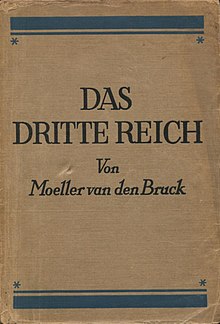
Fascism is a far-right, authoritarian, ultranationalist political ideology and movement, characterized by a dictatorial leader, centralized autocracy, militarism, forcible suppression of opposition, belief in a natural social hierarchy, subordination of individual interests for the perceived good of the nation and/or race, and strong regimentation of society and the economy.

The Nazi Party, officially the National Socialist German Workers' Party, was a far-right political party in Germany active between 1920 and 1945 that created and supported the ideology of Nazism. Its precursor, the German Workers' Party, existed from 1919 to 1920. The Nazi Party emerged from the extremist German nationalist, racist and populist Freikorps paramilitary culture, which fought against communist uprisings in post–World War I Germany. The party was created to draw workers away from communism and into völkisch nationalism. Initially, Nazi political strategy focused on anti–big business, anti-bourgeois, and anti-capitalist rhetoric; it was later downplayed to gain the support of business leaders. By the 1930s, the party's main focus shifted to antisemitic and anti-Marxist themes. The party had little popular support until the Great Depression, when worsening living standards and widespread unemployment drove Germans into political extremism.
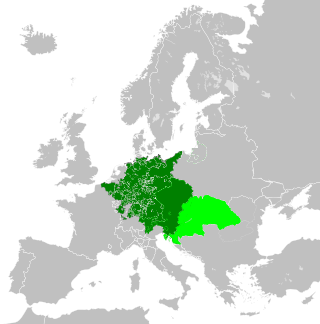
Reich is a German noun whose meaning is analogous to the English word "realm"; this is not to be confused with the German adjective "reich" which means "rich". The terms Kaiserreich and Königreich are respectively used in German in reference to empires and kingdoms. The Cambridge Advanced Learner's Dictionary indicates that in English usage, the term "Third Reich" refers to "Germany during the period of Nazi control from 1933 to 1945".
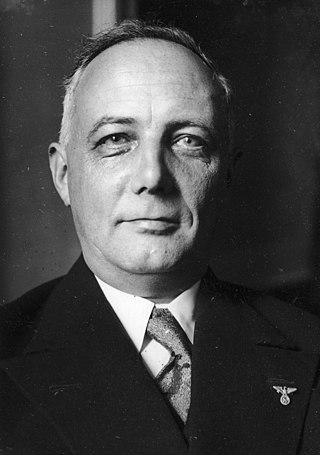
Hermann Adolf Reinhold Rauschning was a German politician and author, adherent of the Conservative Revolution movement who briefly joined the Nazi movement before breaking with it. He was the President of the Senate of the Free City of Danzig from 1933 to 1934. In 1934, he renounced Nazi Party membership and in 1936 emigrated from Germany. He eventually settled in the United States and began openly denouncing Nazism. Rauschning is chiefly known for his book Gespräche mit Hitler in which he claimed to have had many meetings and conversations with Adolf Hitler.

Edgar Julius Jung was a German lawyer born in Ludwigshafen in the Kingdom of Bavaria. He was a leader of the conservative revolutionary movement in Germany which stood not only in opposition to the Weimar Republic, whose parliamentarian system he considered decadent and foreign-imposed, but also opposed National Socialism. Jung was murdered in the 1934 Night of the Long Knives purge.

The political views of Adolf Hitler, dictator of Germany from 1933 to 1945, have presented historians and biographers with some difficulty. Hitler's writings and methods were often adapted to need and circumstance, although there were some steady themes, including antisemitism, anti-communism, anti-slavism, anti-parliamentarianism, German Lebensraum, belief in the superiority of an "Aryan race" and an extreme form of German nationalism. Hitler personally claimed he was fighting against "Jewish Marxism".
The Conservative Revolution, also known as the German neoconservative movement, or new nationalism, was a German national-conservative movement prominent during the Weimar Republic and Austria, in the years 1918–1933.
The Fourth Reich is a hypothetical Nazi Reich that is the successor to Adolf Hitler's Third Reich (1933–1945). The term has been used to refer to the possible resurgence of Nazi ideas, as well as pejoratively by political opponents.
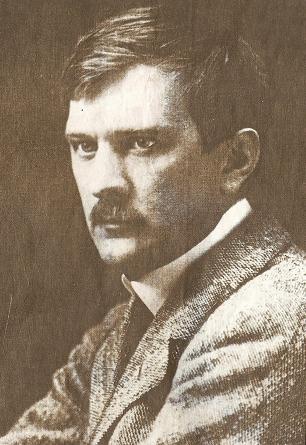
Arthur Wilhelm Ernst Victor Moeller van den Bruck was a German cultural historian, philosopher and writer best known for his controversial 1923 book Das Dritte Reich, which promoted German nationalism and strongly influenced the Conservative Revolutionary movement and then the Nazi Party, despite his open opposition and numerous criticisms of Adolf Hitler.
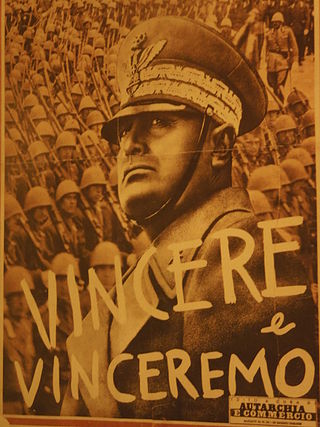
The history of fascist ideology is long and it draws on many sources. Fascists took inspiration from sources as ancient as the Spartans for their focus on racial purity and their emphasis on rule by an elite minority. Fascism has also been connected to the ideals of Plato, though there are key differences between the two. Fascism styled itself as the ideological successor to Rome, particularly the Roman Empire. From the same era, Georg Wilhelm Friedrich Hegel's view on the absolute authority of the state also strongly influenced fascist thinking. The French Revolution was a major influence insofar as the Nazis saw themselves as fighting back against many of the ideas which it brought to prominence, especially liberalism, liberal democracy and racial equality, whereas on the other hand, fascism drew heavily on the revolutionary ideal of nationalism. The prejudice of a "high and noble" Aryan culture as opposed to a "parasitic" Semitic culture was core to Nazi racial views, while other early forms of fascism concerned themselves with non-racialized conceptions of the nation.
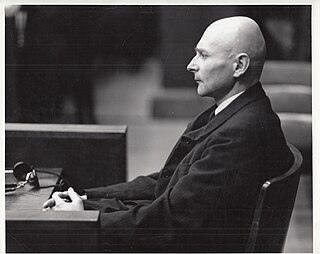
Friedrich Hielscher was a German intellectual involved in the Conservative Revolutionary movement during the Weimar Republic and in the German resistance during the Nazi era. He was the founder of an esoteric or Neopagan movement, the Unabhängige Freikirche, which he headed from 1933 until his death.

Fascist architecture encompasses various stylistic trends in architecture developed by architects of fascist states, primarily in the early 20th century. Fascist architectural styles gained popularity in the late 1920s with the rise of modernism along with the ultranationalism associated with fascist governments in western Europe. Fascist styles often resemble that of ancient Rome, but can extend to modern aesthetics as well. Fascist-era buildings are frequently constructed with particular concern given to symmetry and simplicity.
Conservatism in Germany has encompassed a wide range of theories and ideologies in the last three hundred years, but most historical conservative theories supported the monarchical/hierarchical political structure.
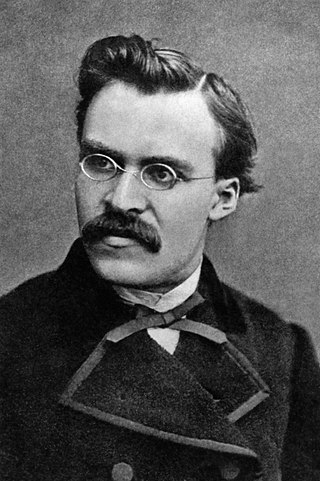
Friedrich Nietzsche's influence and reception varied widely and may be roughly divided into various chronological periods. Reactions were anything but uniform, and proponents of various ideologies attempted to appropriate his work quite early.

Fascist movements in Europe were the set of various fascist ideologies which were practiced by governments and political organizations in Europe during the 20th century. Fascism was born in Italy following World War I, and other fascist movements, influenced by Italian Fascism, subsequently emerged across Europe. Among the political doctrines which are identified as ideological origins of fascism in Europe are the combining of a traditional national unity and revolutionary anti-democratic rhetoric which was espoused by the integral nationalist Charles Maurras and the revolutionary syndicalist Georges Sorel.
The foreign policy and war aims of the Nazis have been the subject of debate among historians. The Nazis governed Germany between 1933 and 1945. There has been disagreement over whether Adolf Hitler aimed solely at European expansion and domination, or whether he planned for a long-term global empire.
Nazism, the common name in English for National Socialism, is the far-right totalitarian socio-political ideology and practices associated with Adolf Hitler and the Nazi Party (NSDAP) in Germany. During Hitler's rise to power in 1930s Europe, it was frequently referred to as Hitlerism. The later related term "neo-Nazism" is applied to other far-right groups with similar ideas which formed after the Second World War when the Nazi regime collapsed.
Agrarian conservatism in Germany was a type of conservatism that began to wane in popularity prior to the rise of the Nazi Party.

From 1933 to 1945, the Nazi regime ruled Germany and, at times, controlled almost all of Europe. During this time, Nazi Germany shifted from the post-World War I society which characterized the Weimar Republic and introduced an ideology of "biological racism" into the country's legal and justicial systems. The shift from the traditional legal system to the Nazis' ideological mission enabled all of the subsequent acts of the Hitler regime to be performed legally. For this to succeed, the normative judicial system needed to be reworked; judges, lawyers and other civil servants acclimatized themselves to the new Nazi laws and personnel. As of 2021, a few laws from the Nazi era still remain codified in German law.
